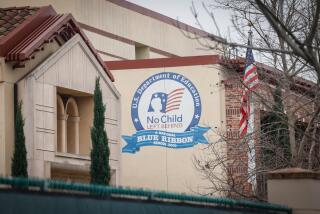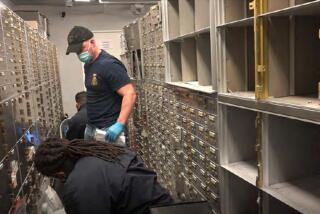Ailing S&L; Will Warn Savers to Limit Deposits : Beverly Hills Savings Prepares Widespread Disclosure of Problems
- Share via
Beverly Hills Savings & Loan, largest of California’s severely troubled S&Ls;, is preparing a widespread disclosure of its financial problems as one way of warning savers to limit the amount of money that they keep on deposit there, The Times has learned.
Also under consideration, according to officials at the company, is a proposal to inform depositors in writing that they should not keep more than $100,000 on deposit at the S&L.; That is the maximum amount per account insured by the Federal Savings and Loan Insurance Corp. should a savings and loan fail.
Beverly Hills Savings has about $15 million in uninsured deposits, according to its president, David Bretoi.
The latest disclosures coincide with efforts by savings and loan regulators to find a buyer for Beverly Hills Savings, which was declared insolvent and put into receivership 18 months ago. No buyer has come forward, though, because the S&L; is losing money, has a large portfolio of non-performing loans and is funded to a large extent by deposits that are unstable, industry officials say.
The Federal Home Loan Bank Board took over Beverly Hills Savings in April, 1985, saying that the financial institution was in an “unsafe and unsound condition.” But the S&L; was kept open for business through a special regulatory program that installed a new management from First Nationwide Financial in San Francisco.
Confirms Proposal
John Carr, First Nationwide’s general counsel, confirmed in a telephone interview that Beverly Hills Savings is planning to disclose its financial condition following a recently completed audit for 1985.
“The board of directors has a duty to make an adequate disclosure,” Carr said, without being more specific. He added that “we have to make sure that no one is surprised” at the S&L;’s financial condition.
The directors’ desire for wider financial disclosure apparently reflects their worry about being sued by unsuspecting large depositors, suggested Ernest Leff, a savings and loan attorney in Beverly Hills. It is these depositors who stand to lose the uninsured part of their savings should the institution close its doors.
The directors are especially nervous, Leff said, because regulators froze the uninsured deposits of Presidio Savings & Loan in Porterville when they closed the S&L; last month.
If those savers at Presidio get their money at all, Leff said, it will be gradually--as the S&L;’s assets are liquidated. Less than 1% of Presidio’s $176 million in deposits was uninsured, regulators say.
$15 Million in Uninsured Deposits
Beverly Hills Savings’ approximately $15 million in uninsured deposits represents less than 1% of the nearly $1.7 billion that the S&L; had on deposit as of March 31, the latest date for which figures are available.
Company officials say Beverly Hills has not received any new uninsured deposits since it was taken over last year and that it now informs depositors by phone not to renew uninsured accounts when their certificates of deposits come due.
But Bretoi, the institution’s president, confirmed that the board of directors may want to send depositors a written admonition about the $100,000 maximum. “We’re relying on government regulators for further guidance,” he said.
Don Alexander, spokesman at the Federal Home Loan Bank of San Francisco, noted: “We get calls from the public all the time, and we tell them all accounts are insured up to $100,000. Beyond that, we can’t make any guarantees.”
Beverly Hills Savings had a negative net worth of $376 million at the end of 1984, according to the last annual audit that was given wide dissemination. Subsequent figures show that the S&L; lost $95 million in 1985 and $24.8 million in the first three months of 1986.
The latest figures were compiled by Kaplan, Smith & Associates, a Glendale consulting firm that is well known in the savings and loan industry. Kaplan, Smith came up with the numbers by using reports provided by the Federal Home Loan Bank Board in Washington.
Although these figures are not confidential, they are rarely made public through press releases. And it is that kind of wider exposure that the board of Beverly Hills is now considering, Carr suggested.
The only other recent public report about Beverly Hills Savings’ financial condition was a balance sheet published as a legal notice in an August issue of the Los Angeles Daily Journal, a limited-circulation legal paper. The balance sheet indicated that Beverly Hills Savings had a negative net worth of more than $500 million at the end of 1985.
Of the institution’s $1.696 billion in deposits on March 31, $950 million were in 1,692 accounts of more than $100,000, public figures show.
However, only a very small portion of the $950 million is actually uninsured because most of those savings were raised through professional money brokers, Bretoi and Alexander said.
These funds, known as brokered deposits, are savings that often qualify for insurance of much more than $100,000 per account because they are owned by many different small depositors.
For example, Alexander said, a $1.2-million certificate of deposit would be fully insured by the Federal Savings and Loan Insurance Corp. if 12 different depositors each own a $100,000 portion of the certificate. These kinds of funds are typically raised for a fee through an investment brokerage firm.
Beverly Hills Savings attracts these brokered deposits, which it needs to fund its operations, by offering among the highest savings rates in California. But these deposits are not considered a stable source of money because they are so rate-sensitive and likely to be withdrawn if returns are higher at other financial institutions.
Beverly Hills Savings is also being funded through a $750-million line of credit from the Federal Home Loan Bank of San Francisco that is guaranteed by the FSLIC. About $203 million of that line of credit remained unused at the end of 1985, the company said in its Los Angeles Daily Journal legal notice.
Beverly Hills Savings, which has relocated its headquarters from Beverly Hills to Mission Viejo in Orange County, has branch offices throughout Southern California. It was the first and largest of the 18 troubled savings and loans in California that have been put into what is known as the management consignment program.
The 18 MCPs, as they are known in industry argot, were kept open under new management while regulators tried to straighten out their bad assets and find new buyers. Since the program was instituted, two of the MCPs--including Presidio--have been closed and another has been sold. The other 15 remain open for business.
San Diego County Business Editor Bill Ritter contributed to this story.
More to Read
Inside the business of entertainment
The Wide Shot brings you news, analysis and insights on everything from streaming wars to production — and what it all means for the future.
You may occasionally receive promotional content from the Los Angeles Times.









